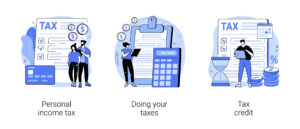Have a Tax Issue With the IRS? You Could Always Take Them to Court
What would you do if the IRS makes a decision you don’t agree with? For example, let’s say you file a tax return and send it in expecting to receive a refund of $1,500. However, a few weeks later, instead of receiving your refund, you get a letter in the mail informing you that you made a mistake and you will only be receiving $1,100. You’d be upset for sure, but most people probably figure there’s nothing they can do about it.
Actually, that’s not the case. Did you know that if you disagree with the IRS on your return you could ask them to change their decision? That sounds like a futile move, right? Why would they change their mind? There is another option, though. If you really feel that you have been treated unjustly you can take the IRS to the United States tax Court. That doesn’t sound very fun, either, but it is an option.
The good news is that the U.S. Tax Court is not affiliated with the IRS. That means the IRS is in the same boat as you if your case goes to trial. There are several reasons that people decide to challenge the IRS in court, which include:
- The IRS assess a deficiency
- An abatement request
- Request relief from a joint return
- Disagreements on worker classification
- Summons enforcement
- Gross income
- Accuracy-related penalty
While most people would rather not spend any more time dealing with the IRS than they have to, if you do feel you have been treated unfairly by the tax agency, then you don’t have to just sit back and take it.
Income the IRS Can’t Touch
Income the IRS Can’t Touch There’s one readily available and legal source of untaxed income that we know of: municipal bonds. These securities are issued by state and local governments, school districts, hospitals and other public agencies to support community projects and services. To permit these worthy endeavors to raise money economically, Uncle Sam exempts…
Avoiding Real Estate Tax Revaluations
Avoiding Real Estate Tax Revaluations by Steven Singer, CPA As a result of the passage of Proposition 13 almost thirty years ago, real estate owners currently enjoy paying property taxes based on the property’s purchase price, value of improvements and an annual increase of 2% over the previous years’ assessed value. As a result of…
Annuities in Qualified Retirement Plans
Annuities in Qualified Retirement Plans By Russell Hill Using annuities in qualified retirement plans. Qualified annuities reduce your current taxable salary in addition to accumulating tax deferred earnings, when you contribute money to an annuities program through an employer (as one of the investment options in a salary reduction retirement plan). Those who work for…
Paying Too Much In Taxes?
Paying Too Much In Taxes? By Theodore Lanzaro Now that the end of the year is near, it is time to review a few business tax tips for 2008. Anyone who owns a business or is planning to start a new business in 2008 should be thinking about maximizing the profitability of their business and…


